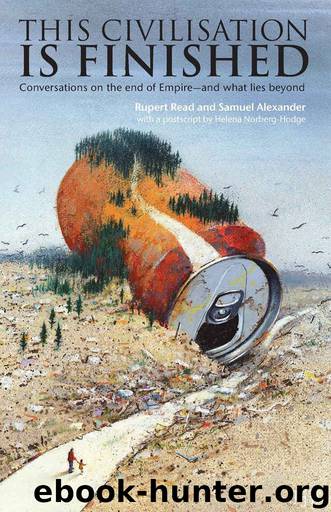This Civilisation Is Finished: Conversations on the End of Empire - and What Lies Beyond by Rupert Read & Samuel Alexander

Author:Rupert Read & Samuel Alexander [Read, Rupert & Alexander, Samuel]
Language: eng
Format: epub
ISBN: 9780994282835
Google: G15wxQEACAAJ
Amazon: B07V59CN1P
Publisher: Simplicity Institute
Published: 2019-03-31T04:00:00+00:00
13. CRISIS AS OPPORTUNITY
SA: You alluded earlier to the saying that every crisis is an opportunity—from which the optimist infers that the more crises there are, the more opportunities there are! Of course, this statement must not be seen to be romanticising or desiring crisis like some dreamy-eyed fool. In fact, our entire dialogue seems to have been based on a deep pessimism about the prospects of smoother and less disruptive modes of societal transformation. So perhaps crisis might be our best hope for disrupting the status quo and initiating the transition to something else.
When the crises of capitalism deepen, as they seem destined to do in coming years and decades, the task will be to ensure that such destabilised conditions are used to advance progressive humanitarian and ecological ends rather than exploited to further entrench the austerity politics of neoliberalism. I recognise, of course, that the latter remains a real possibility, as did the arch-capitalist Milton Friedman, who expressed the point in these terms:
Only a crisis—actual or perceived—produces real change. When that crisis occurs, the actions that are taken depend on the ideas that are lying around. That, I believe, is our basic function: to develop alternatives to existing policies, to keep them alive and available until the politically impossible becomes the politically inevitable.
It is not often that I am in agreement with Friedman. With reluctance I have come to the conclusion that it is probably only through deepening crisis that the comfortable global consumer class will become sufficiently perturbed that the sedative and depoliticising effects of affluence might be overcome. In fact, I feel it is better that citizens are not in fact protected from every crisis situation, given that the encounter with crisis can play an essential consciousness raising role, if it triggers a desire for and motivation toward learning about the structural underpinnings of the crisis situation itself.
RR: Yes, the danger, if we are protected from crisis for too long, is that we wait even longer than we would have done otherwise before addressing it. This is why Jared Diamond and others have emphasised the grave danger of highly unequal societies (such as, disastrously, the one we now inhabit): for the elite in such societies can fool themselves into thinking that things are basically OK way past the point of no return, while the masses suffer and start to experience collapse; and then it is surer that the society as a whole will collapse.
SA: And yet, as I have noted, crisis can go in many directions—it might be the wake-up call we need… or it might simply hasten the civilisational degeneration into barbarism. What role does crisis play in your views on transition? Is the world ready for the profound challenges that, in one form or another, lie ahead?
RR: We are now committed to climate disasters, and they will worsen, for a long time to come. But we do not yet know whether we are committed to climate catastrophe. It is just possible that the former may help enable us to avoid the latter.
Download
This site does not store any files on its server. We only index and link to content provided by other sites. Please contact the content providers to delete copyright contents if any and email us, we'll remove relevant links or contents immediately.
International Integration of the Brazilian Economy by Elias C. Grivoyannis(111057)
The Radium Girls by Kate Moore(12027)
Turbulence by E. J. Noyes(8047)
Nudge - Improving Decisions about Health, Wealth, and Happiness by Thaler Sunstein(7706)
The Black Swan by Nassim Nicholas Taleb(7128)
Rich Dad Poor Dad by Robert T. Kiyosaki(6632)
Pioneering Portfolio Management by David F. Swensen(6300)
Man-made Catastrophes and Risk Information Concealment by Dmitry Chernov & Didier Sornette(6019)
Zero to One by Peter Thiel(5801)
Secrecy World by Jake Bernstein(4752)
Millionaire: The Philanderer, Gambler, and Duelist Who Invented Modern Finance by Janet Gleeson(4478)
The Age of Surveillance Capitalism by Shoshana Zuboff(4291)
Skin in the Game by Nassim Nicholas Taleb(4248)
The Money Culture by Michael Lewis(4207)
Bullshit Jobs by David Graeber(4190)
Skin in the Game: Hidden Asymmetries in Daily Life by Nassim Nicholas Taleb(4004)
The Dhandho Investor by Mohnish Pabrai(3764)
The Wisdom of Finance by Mihir Desai(3746)
Blockchain Basics by Daniel Drescher(3581)
